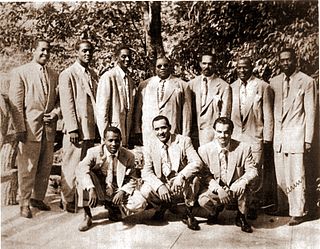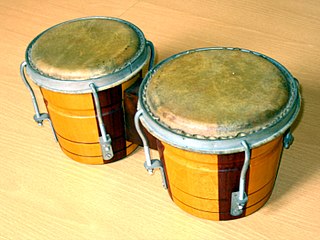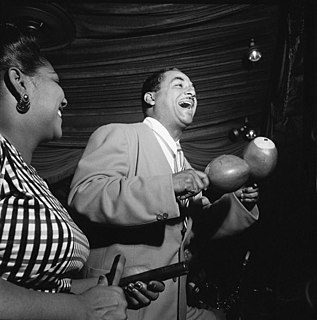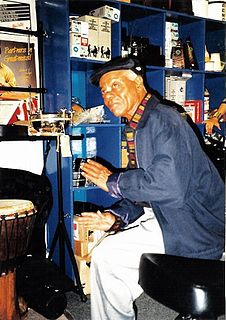Related Research Articles
Latin jazz is a genre of jazz with Latin American rhythms. The two main categories are Afro-Cuban jazz, rhythmically based on Cuban popular dance music, with a rhythm section employing ostinato patterns or a clave, and Afro-Brazilian jazz, which includes bossa nova and samba.

Arsenio Rodríguez was a Cuban musician, composer and bandleader. He played the tres, as well as the tumbadora, and he specialized in son, rumba and other Afro-Cuban music styles. In the 1940s and 1950s Rodríguez established the conjunto format and contributed to the development the son montuno, the basic template of modern-day salsa. He claimed to be the true creator of the mambo and was an important as well as a prolific composer who wrote nearly two hundred songs.

Callen Radcliffe Tjader, Jr. was an American Latin jazz musician, known as the most successful non-Latino Latin musician. He explored other jazz idioms, even as he continued to perform the music of Cuba, the Caribbean, Mexico and Latin America.

Bongos are an Afro-Cuban percussion instrument consisting of a pair of small open bottomed drums of different sizes. In Spanish the larger drum is called the hembra (female) and the smaller the macho (male). Together with the conga or tumbadora, and to a lesser extent the batá drum, bongos are the most widespread Cuban hand drums, being commonly played in genres such as son cubano, salsa and Afro-Cuban jazz. A bongo drummer is known as a bongosero.

The conga, also known as tumbadora, is a tall, narrow, single-headed drum from Cuba. Congas are staved like barrels and classified into three types: quinto, tres dos or tres golpes (middle), and tumba or salidor (lowest). Congas were originally used in Afro-Cuban music genres such as conga and rumba, where each drummer would play a single drum. Following numerous innovations in conga drumming and construction during the mid-20th century, as well as its internationalization, it became increasingly common for drummers to play two or three drums. Congas have become a popular instrument in many forms of Latin music such as son, descarga, Afro-Cuban jazz, salsa, songo, merengue and Latin rock.
Afro-Cuban jazz is the earliest form of Latin jazz. It mixes Afro-Cuban clave-based rhythms with jazz harmonies and techniques of improvisation. Afro-Cuban jazz emerged in the early 1940s with the Cuban musicians Mario Bauzá and Frank Grillo "Machito" in the band Machito and his Afro-Cubans in New York City. In 1947, the collaborations of bebop trumpeter Dizzy Gillespie and percussionist Chano Pozo brought Afro-Cuban rhythms and instruments, such as the tumbadora and the bongo, into the East Coast jazz scene. Early combinations of jazz with Cuban music, such as "Manteca" and "Mangó Mangüé", were commonly referred to as "Cubop" for Cuban bebop.
A descarga is an improvised jam session consisting of variations on Cuban music themes, primarily son montuno, but also guajira, bolero, guaracha and rumba. The genre is strongly influenced by jazz and it was developed in Havana during the 1950s. Important figures in the emergence of the genre were Cachao, Julio Gutiérrez, Bebo Valdés, Peruchín and Niño Rivera in Cuba, and Tito Puente, Machito and Mario Bauzá in New York. Originally, descargas were promoted by record companies such as Panart, Maype and Gema under the label Cuban jam sessions. From the 1960s, the descarga format was usually adapted by large salsa ensembles, most notably the Fania All-Stars.

Machito was a Latin jazz musician who helped refine Afro-Cuban jazz and create both Cubop and salsa music. He was raised in Havana with the singer Graciela, his foster sister.
Mario Bauzá was a jazz, Latin, and Afro-Cuban jazz musician. He was among the first to introduce Cuban music to the United States by bringing Cuban musical styles to the New York City jazz scene. While Cuban bands had had popular jazz tunes in their repertoire for years, Bauzá's composition "Tangá" was the first piece to blend jazz harmony and arranging technique, with jazz soloists and Afro-Cuban rhythms. It is considered the first true Afro-Cuban jazz or Latin jazz tune.

Cándido Camero Guerra, known simply as Cándido, was a Cuban conga and bongo player. He is considered a pioneer of Afro-Cuban jazz and an innovator in conga drumming. He was responsible for the development of tuneable conga sets, as well as the combination of congas and bongos, and other instruments such as the foot-operated cowbell.

Israel López Valdés, better known as Cachao, was a Cuban double bassist and composer. Cachao is widely known as the co-creator of the mambo and a master of the descarga. Throughout his career he also performed and recorded in a variety of music styles ranging from classical music to salsa. An exile in the United States since the 1960s, he only achieved international fame following a career revival in the 1990s.
Wilton Jameson "Jamey" Aebersold is an American publisher, educator, and jazz saxophonist. His Play-A-Long series of instructional books and CDs, using the chord-scale system, the first of which was released in 1967, are an internationally renowned resource for jazz education. His summer workshops have educated students of all ages since the 1960s.

Armando Peraza was a Latin jazz percussionist and a member of the rock band Santana. Peraza played congas, bongos, and timbales.
Arturo "Chico" O'Farrill was a Cuban composer, arranger, and conductor, best known for his work in the Latin idiom, specifically Afro-Cuban jazz or "Cubop", although he also composed traditional jazz pieces and even symphonic works.
Francisco Aguabella was an Afro-Cuban percussionist whose career spanned folk, jazz, and dance bands. He was a prolific session musician and recorded seven albums as a leader.
"Naima" is a ballad composed by John Coltrane in 1959 that he named after his wife, Juanita Naima Grubbs. It first appeared on the album Giant Steps and is notable for its use of a variety of rich chords over a bass pedal. It is mainly made up of a slow, restrained melody, though there is also a brief piano solo by Tommy Flanagan
Carlos Valdés Galán, better known as Patato, was a Cuban conga player. In 1954, he emigrated from La Habana to New York City where he continued his prolific career as a sideman for several jazz and Latin music ensembles, and occasionally as a bandleader. He contributed to the development of the tunable conga drum which revolutionized the use of the instrument in the US. His experimental descarga albums recorded for Latin Percussion are considered the counterpart to the commercial salsa boom of the 1970s. Tito Puente once called him "the greatest conguero alive today".
Candela is a San Francisco-based nine piece salsa music and Latin jazz band created in 1986 under the direction of Uruguayan born lead singer and conga drummer Edgardo Cambón. It consists of piano, bass, trombones, conga drums, bongo drums, timbalesFlute and vocals. "Candela" is one of the "oldest" Salsa Bands, in the Bay Area, having performed consistently an average of 4 performances a month for over 30 years!
Bobby Sanabria is an American drummer, percussionist, composer, arranger, producer, educator, radio host of Puerto Rican descent who specializes in jazz and Latin jazz. An 8X Grammy nominee as a leader, he is the musical director of Quarteto Aché, Sexteto Ibiano, Ascensión, and his Multiverse Big Band. He is on the faculty of The New School for Jazz and Contemporary Music, NYU and for 20 years was on the faculty of the Manhattan School of Music in New York City. Seven of Sanabria's albums have been nominated for a Grammy Award: Afro-Cuban Dream: Live & In Clave!!! (2000), 50 Years of Mambo - A Tribute To Damaso Prado (2003), Big Band Urban Folktales (2007) Kenya Revisited Live!!! (2009), Tito Puente Masterworks Live!!! (2011), Multiverse - nominated for two Grammys (2012), West Side Story Reimagined (2018) which was also named Record of The Year by the Jazz Journalist's Association (2019). He has received numerous awards and accolades including the 2018 LeJENS of Latin Jazz Award Keepers of the Flame Lifetime Achievement Award in recognition of his leadership and innovation in Latin jazz and the 2019 New York International Salsa Congress David Melendez Lifetime Achievement Award for his extraordinary contributions to Latin music as a musician, teacher, historian, radio host and dedication to preserving the art of Latin music and Latin jazz. He was named "Padrino (Godfather) of the 2019 National Puerto Rican Day in New York City.
A guajeo is a typical Cuban ostinato melody, most often consisting of arpeggiated chords in syncopated patterns. Some musicians only use the term guajeo for ostinato patterns played specifically by a tres, piano, an instrument of the violin family, or saxophones. Piano guajeos are one of the most recognizable elements of modern-day salsa. Piano guajeos are also known as montunos in North America, or tumbaos in the contemporary Cuban dance music timba.
References
- ↑ "Latin Jazz - Volume 74 by Jamey Aebersold Play-A-Long, Mark Levine, David Belove, Harold Muniz & John Santos". iTunes. Retrieved December 19, 2020.
- ↑ "David Belove". JazzTimes. Retrieved December 19, 2020.
- ↑ "David Belove". Bass Mods. Retrieved December 19, 2020.
- ↑ "The Cast and Crew". The Last Mambo. Retrieved December 19, 2020.
- This article incorporates material from the Citizendium article "David Belove", which is licensed under the Creative Commons Attribution-ShareAlike 3.0 Unported License but not under the GFDL.
| This article about an American jazz guitarist is a stub. You can help Wikipedia by expanding it. |